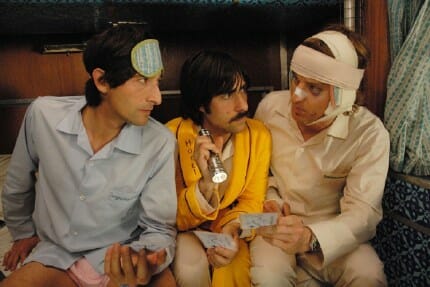
East Meets Wes
Wes Anderson goes slightly off-track for his most mature effort yet
Release Date: Sept. 29 (Limited)
Director: Wes Anderson
Writers: Wes Anderson, Roman Coppola, Jason Schwartzman
Cinematographer: Robert Yeoman
Starring: Owen Wilson, Adrien Brody, Jason Schwartzman
Studio/Run Time Fox Searchlight, 91 mins.
Watching a Wes Anderson movie means (for better or worse) slipping into a few of the young director’s comfortably worn tropes: quirky but loveless men and distantly idolized women, all chain smoking as they move in slow motion through meticulously arranged rooms to the strains of sumptuous ’60s pop, all seeking—if not love—then whatever it gets mistaken for these days. From Bottle Rocket’s Dignan to Rushmore’s Herman Blume, Anderson’s men still behave like petulant children in the throes of arrested development, while the women—be they Margot Tenenbaum or Eleanor Zissou—are chilly and hastily sketched, serving mainly as objects of desire for the male leads to place on pedestals. All of Anderson’s characters blindly stumble about, emotionally estranged from family, relationships, themselves, and ultimately reality. And yet for all of their personal tumult, they exist in a cute, stylized world as tidy as any play or book.
In The Darjeeling Limited, such orderliness comes in the form of a continental train through India (shot on location by Anderson and crew), with designated stops and time slots on a laminated itinerary. The sets remain exactly detailed by Zissou designer Mark Friedberg, and the soundtrack is sweated so as to be perfect. Yet for all of Anderson’s obsessive-compulsive tendencies, The Darjeeling Limited is his most mature effort to date, precisely because he veers off the tracks and bucks against his past tendencies, even if he doesn’t eschew them entirely.
The story centers on the three disaffected Whitman brothers, Francis (Owen Wilson), Peter (Adrien Brody) and Jack (Jason Schwartzman), who seek to reacquaint themselves on the train trip. All of them are emotionally stunted, still reeling from the death of their father and the absence of their mother. Francis has just survived a near-death motorcycle accident that threw him face-?rst into a hillside, and for the duration of the ?lm, Wilson delivers his lines through a thick swath of gauze and Ace bandages. Regretting that he’s not closer to his brethren, he plans a train trip through the country, down to the very last detail, so as to bond.
But his brothers have their own reasons to get out of the country. Jack, the youngest, is trying to put some distance between himself and his ex, even though he remains obsessed enough to eavesdrop on her answering machine messages. Peter seems to have it all together, married with a child on the way, yet he neglects to mention to his wife that he’s going to India and fears the imminent responsibilities of fatherhood. Cramped together in a tight sleeper car, they begin in?aming old grudges almost immediately, all the while dealing with their pain the only way they know how, from micro-managing every last second of the day to wantonly abusing pharmaceuticals.
Even as the Whitmans hit their pre-ordained destinations, visit holy sites and wave around peacock feathers, they remain spiritually clueless. After a string of comedic mishaps, the brothers ?nd themselves jettisoned from the Darjeeling Limited train, stranded in the stark Indian countryside (its expanse captured warmly by longtime Anderson DP, Robert Yeoman) with their dead father’s custom-made suitcases, a laminating machine and little else. Derailed and woefully off-schedule, both Anderson and the brothers soon stumble upon the movie’s emotional core.
Whereas previous Anderson ?lms tend to rely on characters plainly (and unbelievably) speaking their emotional state outright, Darjeeling’s ensemble cast plays it closer to the vest. The film’s most evocative scenes involve small glances, gestures and wordless exchanges between the three men, and at the movie’s culminating encounter, the suggestion is made: “Maybe we could express ourselves more fully without words.”
They do. But soon after, Anderson reverts back to old habits. Despite the appearance of Anjelica Huston as the brothers’ absentee runaway mother and newcomer Amara Karan as a doe-eyed dalliance of Jack’s on the moving train, Anderson seems wholly unable to reveal any depth in his female characters. Perhaps resigned to that fact, he keeps both women at the absolute periphery, focusing instead on the brothers’ search for redemption.
For most of the ?lm, Anderson relies on low-key soundtrack music by the likes of Ravi Shankar and Satyajit Ray (gleaned from Bollywood ?lms like Bombay Talkie and Jalsaghar) to properly capture the ?avor of this awe-inspiring, complex country. When it’s time to yank heartstrings though, he starts cranking up stand-bys from the Kinks and the Stones and reducing his images to half-speed, so that it seems more like a music video than a movie. Falling back on such clichés, the emotional catharsis of the Whitman brothers nevertheless remains hard-fought. As they realize at ?lm’s end that the wounds of the past aren’t yet healed, such a ?nal destination—while far from perfect—feels that much more welcome.